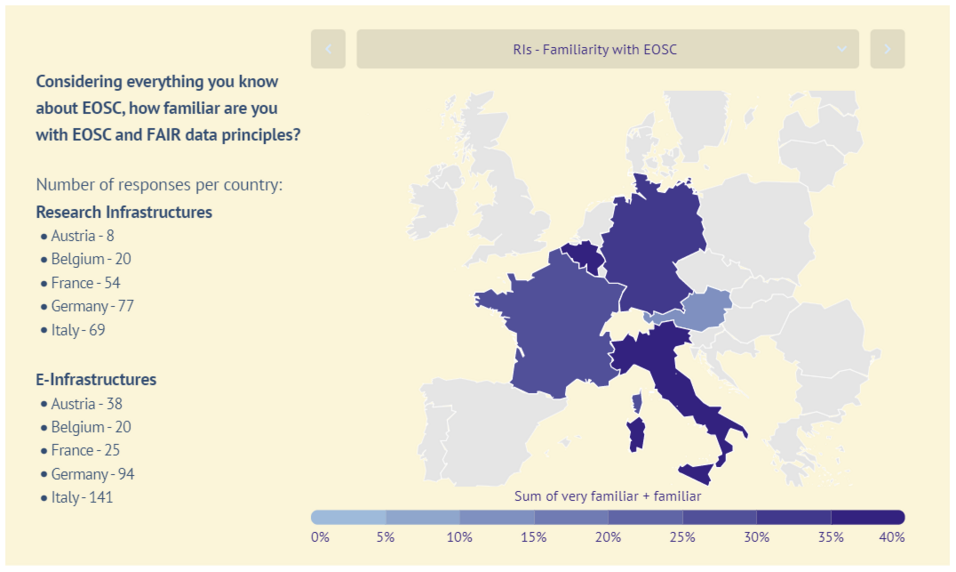The European Open Science Cloud (EOSC) is a virtual environment to combine existing scientific data infrastructures in order to make it easier to find, access, and reuse research data, tools and services and to interlink and combine data sets with other data sets across disciplines and borders.
When striving to develop the European Open Science Cloud, it is crucial to first gain an overview of the status quo concerning open science and open data in Europe. How familiar are research performing organisations and funding bodies with FAIR principles? Which policies have they already implemented? And do they expect benefits from EOSC? Do e-infrastructures restrict access to their services?
To answer these and many more questions, EOSC-Pillar has conducted the "National Initiatives Survey" among universities, funding bodies, research infrastructures and e-infrastructures in the five EOSC-Pillar countries Austria, Belgium, France, Germany, and Italy. By analysing organisational, technical as well as legal aspects that are relevant to open science and managing data, the survey covered the whole research data life cycle - from data collection and processing to archiving, dissemination, and reuse. The manager of the "National Initiatives" Survey Work Package, Lisa Hönegger from AUSSDA at the Vienna University Library, said: "We wanted to create a comprehensive picture of the research supporting infrastructure with state-of-the-art data in order to support creating the European Open Science Cloud and to provide empirical data for evidence-based decision making."
Some results on EOSC and FAIR
Overall, EOSC-Pillar invited representatives of 2,204 organisations to participate in the National Initiatives survey, of which 31% seized this opportunity. Across the five EOSC-Pillar countries, 27 funding bodies, 114 universities, 229 research infrastructures and 318 e-infrastructures responded (in full or partially) to the survey. Among many other aspects, the survey asked about the familiarity with FAIR principles as well as EOSC.
Results show that a vast majority of the funding bodies in the survey perceive themselves as familiar with EOSC (69%) and the FAIR principles (77%).
Among representatives of universities, the survey team found a lower familiarity with EOSC (41% across countries). However, the level of familiarity with FAIR data is comparable to the one found among funding bodies as 76% of the university representatives are on average familiar with FAIR principles.
A similar picture is observed regarding familiarity with EOSC and FAIR data for research infrastructures, which are on average more familiar with FAIR principles (70%) than with EOSC (29%).
E-infrastructures also show a high familiarity with the FAIR principles: More than 70% indicate to be familiar with it, with even more than 80% in Germany, France, and Italy. The familiarity with EOSC is lower across countries, with less than half of e-infrastructure representatives being familiar with EOSC.
How the survey will impact EOSC
EOSC-Pillar shared information on the research design early onwards so that other regional projects, i.e. EOSC-Synergy, EOSC-Nordic and Ni4os-Europe, could reuse and adapt the survey design. This will facilitate comparing the research infrastructure landscape across Europe.
Within EOSC-Pillar, the data is supporting further project activities e.g. on business models. Moreover, the survey team is disseminating the results beyond the project to stakeholders across Europe and delivering the survey results to the EOSC governance, to national representatives of research and open science and all other stakeholders involved or interested in the implementation of the European Open Science Cloud.
In a next step, the project will engage into discussions with experts with the goal to derive recommendations from the data in order to support the harmonisation of services and ultimately their integration into EOSC. How can the momentum of Open Access publications be used to enhance FAIR data? Which target groups need to be further convinced of the benefits of EOSC? These are some of the questions that can nourish further discussions in the future.
By having created this overview, EOSC-Pillar delivered the basis for steering policies which support developing the European infrastructure landscape for open research data and hopes to initiate fruitful developments.
The data is now available under the DOI 10.11587/VOSVGK, the summary report under the DOI 10.5281/zenodo.3937318.

